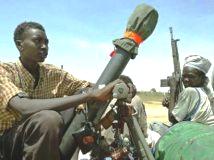Arms flow to Sudan’s Darfur despite embargo – UN
Jan 10, 2006 (UNITED NATIONS) — Weapons are flowing to anti-government rebels in Sudan’s strife-torn Darfur region from neighboring Chad, Eritrea and Libya in violation of a U.N. arms embargo, U.N. experts said in a report obtained by Reuters on Tuesday.

|
|
Members of Sudan Liberation Army ride on a truck at Ashma village 30 km (19 miles) from Nyala, south Darfur, October 6, 2004. . |
The embargo, imposed on all non-government forces in Darfur in July 2004, has also failed to prevent the government from arming the Arab militias that act as its proxy fighters in the Darfur conflict, the experts said.
Since a second civil war ended in southern Sudan, the government has in addition shifted troops, arms and attack helicopters from the south to Darfur in the west, they said.
Southern rebel groups have at the same time helped train and arm the rebel fighters in Darfur, the panel reported.
“It is clear that arms, especially small arms and ammunition, continue to enter Darfur from a number of countries and other regions of Sudan,” the experts concluded.
The U.N. Security Council’s committee on Sudan sanctions had been expected to formally submit the 142-page report to the council on Monday but was temporarily blocked from doing so after Qatar and China objected.
Qatar, the council’s sole Arab member, requested a review of the text after questioning whether the experts’ work was sufficiently “professional,” council diplomats said.
China, which has oil interests in Sudan, backed Qatar’s request, said the envoys, speaking on condition of anonymity.
The United Nations was closed in observance of a Muslim holiday on Tuesday and no one was immediately available for comment at the Chinese or Qatari missions in New York.
AFRICAN UNION ROLE UNDER REVIEW
Word of the illegal arms flows to the region comes as the Security Council weighs transforming the African Union peacekeeping force now in Darfur into a larger U.N. mission.
Many governments and U.N. officials say the 6,800 AU troops there have failed to stem the fighting and protect civilians.
U.S. Ambassador John Bolton said consultations were continuing among council members and AU states this week.
“A lot of people in the AU are reluctant to see the mission shift because it would be seen as an AU failure. We don’t see it that way, but you have to go through the consultations,” Bolton told reporters on Tuesday.
A debilitating civil war has raged in Darfur since February 2003, pitting Sudanese rebels against government forces and allied Janjaweed militias. Tens of thousands have been killed and 2 million driven from their homes and forced to flee to miserable camps in Sudan and Chad.
The region, already the site of one of the world’s largest humanitarian disasters, has been further inflamed by a wave of cross-border attacks by Darfur-based Chadian rebels trying to topple Chad’s president, Idriss Deby.
Darfur peace talks in Abuja, Nigeria, have stalled over a split in the rebel leadership.
In the meantime, the U.N. experts said both sides in the Darfur conflict “seem to be able to bring weapons and military supplies into Darfur with relative ease.”
There had been both a buildup of Sudanese forces and an increase in government surveillance flights in recent months, suggesting Khartoum “may be preparing for or anticipating expanded military operations in Darfur,” they said.
“The panel has found substantial evidence to demonstrate that the government of Sudan continues to support certain militia groups and indeed has on occasion engaged in coordinated military operations with armed militia groups,” the experts reported.
There were also many reports of rebels getting “financial, political and other material support from neighboring countries including, Libya, Chad and Eritrea,” they said.
(Reuters)
